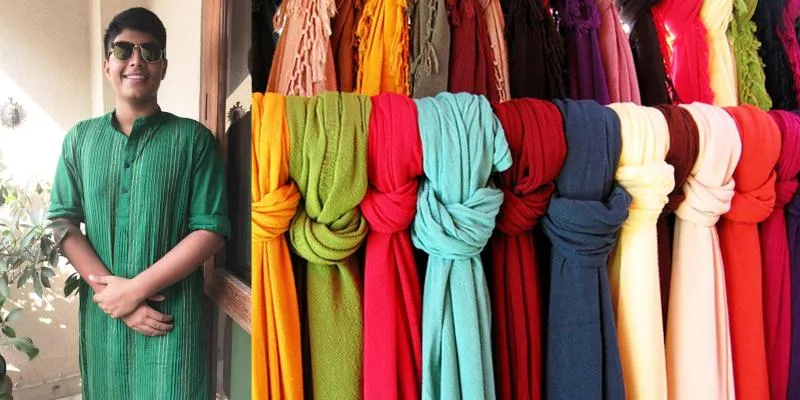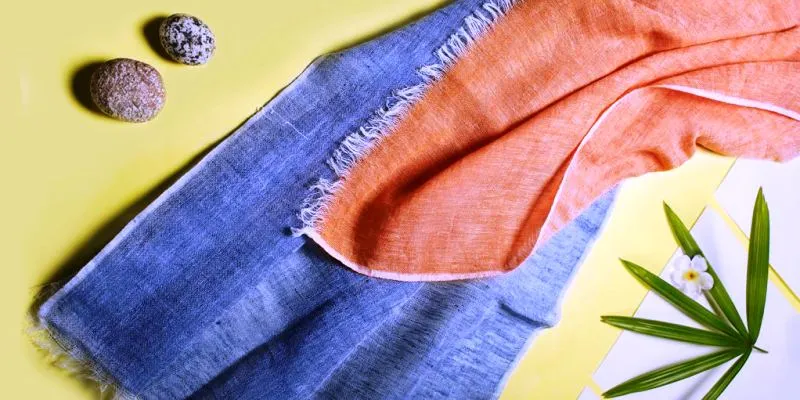This 17-year-old is leading a social venture to revive handloom in India
Ayan Bhattacharya, a class XII student, has started Artysan to support artisans and preserve the textile heritage of India.

Inspired by the culture and tradition of India, handloom garments have great artistic significance. However, a major drawback of the handloom business is the meagre income of the artisans. Besides, the lack of potential for growth in handicrafts is turning the younger generation away from their family business. To tackle these issues, Ayan Bhattacharya, a Class XII student started Artysan.
The beginning of Artysan
Seventeen-year-old Ayan is a regular schoolkid. He loves swimming and playing the tabla. He started swimming at the age of four and is now a national-level swimmer. He’s also won several awards for his tabla performances. Ayan, who is studying commerce at Step by Step School, Noida, never imagined he would start a career so early.
Summer of 2017 witnessed a change in Ayan. Like many teenagers of his age, Ayan was attracted to foreign brands. One day, as he read the newspaper, he came across an article on artisan weavers, focusing on their meagre income and the exploitation they face in the hands of middlemen. The article left his mind circling that topic again and again, wondering for solutions.
The more he delved into the issue, the more he realised how easy it was to fail if he extended a helping hand. Artisanal clothing has obstinately remained a small part of India’s growing apparel market. Upper middle-class Indians, however, prefer international brands over handwoven, traditional cotton-wear.
That’s when his eyes opened to a very simple idea — if schools across India changed their uniforms to handloom fabrics, if offices allowed their employees to wear handloom once a week and if high-profile CEOs traded their suit and tie for a day to come into work in traditional attires, the effect would be unambiguously powerful. Handloom would begin to trend and the demand for it would increase. It was a dream Ayan desperately wanted to make true and thus, Artysan was born.

Preserving tradition through Artysan
Ayan wanted to help artisans in some manner and he decided to start an e-commerce site for selling handloom garments. But running a company while pursuing school seemed like a voluminous task. Setting up a business or a platform required knowledge that Ayan didn’t possess yet. He didn’t let this deter him from his goals. Ayan roped in his father for his plan, and under his guidance, he started Artysan in the month of June.
His first challenge was setting up the website — with knowledge only of the basics, he was new to this area. His father helped him with the website, designing it in a manner that was both visually appealing and informative. The next was setting up various payment and delivery options, managing situations where an item would be out of stock, customers complaints, and many such issues that arise with a business-to-consumer model. Ayan says,
“My journey till date has been really enlightening. I’ve invested a lot into this venture — starting from setting up the website, speaking to the weavers, speaking to customers, and marketing the products on social media — everything was new and difficult and I was required to learn the secrets of the trade very quickly”
“Started and solely maintained by me, Artysan means a lot to me. The social message attached to it, something I feel everyone should be aware of, only makes it more special. I want to consciously work towards spreading awareness about the condition of such weavers and hopefully, encourage more and more people to switch to khadi clothing,” he adds.
Nithya Jayaraman, a customer of Artysan tells us, “Often, we talk of about a better life, how things should be versus how they are but not many are willing to take the first step. It is refreshing to see someone is actually doing it. It is definitely praiseworthy. I am a great lover of handloom and cannot wait to see what else Artysan does.”
Artysan is bootstrapped and works with five weavers. It sells scarves at an affordable price and the income of the weavers has doubled. The team plans to diversify their products to include sarees and kurtas in the near future. With their aim to increase the demand for handloom and artisanal attires, Artysan hopes to have a direct impact on the lives of the weavers in our country. To achieve this, they plan to sell their products on popular ecommerce platforms like Amazon and Flipkart.
“When you join the Artysan revolution, you not only help support artisans but also help preserve the textile heritage of India,” says Ayan.







